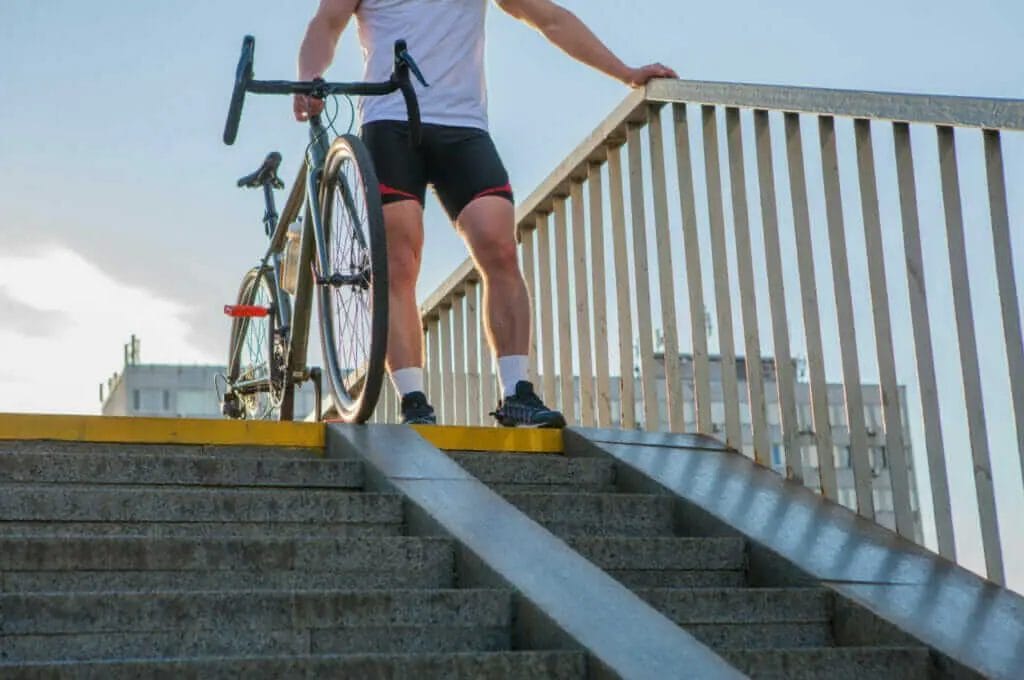Last Updated on February 11, 2024 by Vinson Lozano
Riding bicycles is not only convenient and sustainable, but it also contributes significantly toward physical fitness. The creation of folding bikes has further revolutionized the cycling world. But a common concern is: Are folding bikes safe?
What are folding bikes?

Folding bikes are bicycles designed to fold into a compact form. This overall structure allows for a quick and easy packing up, making them ideal for commuting, storing in small apartments, and carrying onto public transportation.
Advantages of folding bikes
Besides portability and convenience of storage, folding bikes offer several other benefits:
- Versatility: They’re great for both city riding and long-distance touring.
- Ease of Use: Folding bikes are typically straightforward to fold and unfold, requiring no extensive knowledge or tools.
- Security: They can be easily carried and stored indoors, reducing the risk of theft.
- Compatibility: People of varying heights can comfortably ride the same folding bike due to adjustable seats and handlebars.
Despite these advantages, some potential users still question the safety of folding bikes, mainly due to their folding mechanism and typically smaller wheel size. Stay tuned for the next section where we will address safety concerns and evaluate whether folding bikes are as safe as their standard counterparts.
Safety Features of Folding Bikes
The technological advancements have led to the development of folding bikes which are now considered as the ideal choice of transportation for urban commuters. Besides their compact and sleek design, they are also known for their safety features:
Frame and materials
Most folding bikes are built with durable and strong materials such as aluminium and steel which not only help sustain everyday wear and tear but also provide stability and support while riding. The structure of the frame is designed to withstand pressure and shocks to ensure the safety of the rider.
Locking mechanisms
A key distinguishing feature of folding bikes is their robust locking mechanisms. These mechanisms ensure the folded configuration of the bike remains stable during transport and storage. When in the riding mode, they lock in securely, maintaining the rigidity of the bike for a safe and smooth ride.
Braking systems
Folding bikes are equipped with advanced braking systems to offer a responsive stopping power in any environment. Regardless of weather conditions, the braking systems of these bikes are designed to provide reliable and fast stopping capabilities.
To summarize, when considering the purchase of a folding bike, it is important to consider the quality of the frame and materials, the robustness of the locking mechanisms, and the efficiency of the braking systems. By taking these factors into account, it’s clear that folding bikes are an extremely safe choice for any commuter looking for a versatile and compact mode of transportation.
Stability and Performance
When it comes to assessing the safety of folding bikes, it’s crucial to consider their stability and performance.
Stability while riding
Folding bikes are known for their compact size and portability but this does not compromise their stability. Most folding bikes have sturdy frames and are built with high-quality materials that provide adequate support and balance. Their relatively low center of gravity also increases their stability, reducing the risk of falling over during rides.
Handling and maneuverability
Handling and maneuverability are where folding bikes truly excel. Thanks to their smaller wheels and lightweight design, they’re easy to control, exceptionally responsive, and agile in tight spaces. This makes them an ideal choice for commuting in busy city streets.
Performance on different terrains
The performance of folding bikes can vary across different terrains.
- On paved roads: Their compact size and quick acceleration make them excellent for city or street riding.
- Stiff inclines or rough terrains: They may not perform as well as regular mountain bikes or road bikes. However, there are folding bikes specifically designed for off-road use, offering more advanced features to handle these situations.
In conclusion, folding bikes are not only safe but also offer excellent stability and handling. Whether you are looking for a bike for city commuting or adventuring on different terrains, folding bikes provide a portable and efficient solution. The key is to choose a model that fits your specific needs and riding conditions.
Foldability and Compactness
One of the significant benefits of folding bikes is their compactness and foldability. But how easy is it to fold and unfold these bikes? And, how portable and durable are they?
Ease of Folding and Unfolding
Folding bikes are designed with convenience in mind and aim to provide a hassle-free experience when it comes to their primary feature – folding and unfolding. This attribute allows users to seamlessly switch between cycling and carrying, which is particularly useful in city environments. Most folding bikes on the market utilize user-friendly folding mechanisms that make the process quick and effortless, typically taking only a few seconds to a few minutes.
Portability and Storage
The compact nature of folding bikes makes them incredibly portable and easy to store. Their size when folded is significantly reduced compared to regular bikes, making them ideal for those with limited storage space. They fit conveniently in car trunks, under desks, or in crowded bike racks. Some folding bikes even come with carry bags, for easy transportation on public transports or storing away neatly at home or in the office.
Durability of Hinges and Folding Mechanisms
Durability of folding bikes relies heavily on the strength and reliability of their hinges and folding mechanisms. These parts are subjected to some of the highest stresses on the frame when the bike is in use. A pivot point needs to be robust and resistant to wear and tear. High-quality folding bikes usually employ solid, well-engineered hinges and joints that ensure the bikes’ longevity and rider’s safety.
In conclusion, folding bikes combine comfort, convenience, and compactness without sacrificing safety or durability. Hence, they are an excellent choice for urban and commuting cyclists.
Safety Concerns Addressed
When it comes to folding bikes, safety is a frequent concern among potential buyers. Are they as robust and secure as they appear to be? Despite their compact size and unique design, folding bikes have addressed these safety concerns through strength, structural integrity and ensuring adherence to testing and certification standards.
Strength and structural integrity
While folding bikes are designed for convenience and portability, this does not compromise their strength. They are built with the same robust materials as regular bikes. Their frames are typically made from durable and tough materials such as aluminum or steel, which enhance their robustness and longevity.
Testing and certification standards
Quality folding bikes are made according to rigorous testing and certification standards. These standards ensure that the bikes are safe, durable, and reliable. For instance, they go through intensive stress testing to guarantee they can handle the weight of the rider and resist the effects of repetitive folding and unfolding.
Safety precautions for riders
While folding bikes are designed with safety in mind, riders also need to take some precautions. These include regular checks and maintenance of the bike, ensuring the folding mechanisms are securely locked before rides, wearing appropriate safety gears and following traffic rules when riding on the road.
In conclusion, folding bikes are designed to be just as safe, if not safer, than their non-folding counterparts. However, safety also significantly depends on the rider’s habits and precautions.
User Experience and Reviews
With more and more people seeking alternative transportation methods, folding bikes have emerged as a popular choice due to their convenience and portability. However, the question on most potential buyers’ minds is: “Are folding bikes safe?”
Comparisons with Traditional Bikes
On average, folding bikes provide a safe riding experience similar to traditional bicycles. They are designed with robust frames, reliable brakes, and a generally sturdy construction to ensure rider safety. Nevertheless, certain factors could impact a folding bike’s safety in comparison to conventional bikes, such as:
- Riding Comfort: Folding bikes typically have smaller wheels, which means you might feel road bumps more pronouncedly. However, advancements in technology have led to improved cushioning systems in newer models to tackle this issue.
- Durability: Given their portability, folding bikes are subjected to more regular handling than conventional bikes. This constant folding and unfolding might cause wear and tear. Ensure to opt for a model with a robust design and a reliable locking mechanism.
- Riding Visibility: Folding bikes ride lower to the ground, which might make visibility an issue in heavy traffic. Riders can use safety gear like reflective clothing or additional bike lights to combat this concern.
In summary, while folding bikes come with their unique set of considerations, they are generally just as safe as traditional bikes. Proper maintenance and adherence to safety protocols can ensure a secure and enjoyable riding experience. It is crucial to read user reviews and make an informed decision before purchasing a folding bike best suited for your needs.
Maintenance and Inspection
The longevity and the overall safety of your folding bike largely hinge on how well it’s maintained and inspected. Irrespective of how expert you are at folding and unfolding your bike, you cannot overlook the importance of regular checks and maintenance.
Regular Maintenance Tips
Folding bikes are complex machines, and they need regular maintenance for optimal function. Here are some maintenance tips that could go a long way:
- Keep all moving parts clean and lubricated.
- Ensure the folding mechanism works smoothly and locks securely every time.
- Check the tires for proper inflation and wear.
- Clean the chain and gear components regularly.
Checking for Wear and Tear
Wear and Tear is inevitable with use. But, regular checkups can prevent severe damage and ensure safety while riding.
- Regularly inspect the frame for any signs of stress or cracks, particularly around the folding mechanism.
- Check brake pads and replace them if worn down.
- Examine tires for signs of punctures or worn treads.
Safety Checks Before Riding
Before hopping onto your folding bike and hitting the road, you need to perform a few safety checks:
- Ensure the bike is securely locked into its unfolded position.
- Make sure the brakes are functioning correctly.
- Check whether all bolts, nuts, and quick-release levers are tightened.
To summarize, proper maintenance and regular inspection can increase the safety, lifespan, and the performance of your folding bike. Always remember that a well-maintained bike is a safe bike.
Conclusion
Are Folding Bikes Safe?
Despite their convenience and portability, some people have concerns about the safety of folding bikes. However, if used correctly and maintained properly, folding bikes can be as safe as regular bikes. Like all bicycles, safety largely rests on the usability of their features, such as the folds, hinges, and latches. It’s vital to ensure these components are of high quality and remain in good shape through regular checks and timely repair.
Factors to Consider Before Purchasing a Folding Bike
Before you decide to invest in a folding bike, there are several factors you should consider:
- Quality of Construction: Ensure that the bike is made from durable and high-quality materials such as steel or aluminum.
- Hinge Mechanism: The hinge mechanism is crucial for the folding and unfolding process. Ensure that the hinge is sturdy and secure.
- Wheel Size: The wheel size affects the smoothness of the ride and bike stability. Standard folding bikes come with a 16″ or 20″ wheel size.
- Weight: Lightweight models are easier to fold, carry, and store, but they can also be less sturdy.
- Price: More expensive models generally offer better build quality and a smoother ride, but they can be overkill for casual riders.
Always take time to research and test-ride several bikes before making your decision. Folding bikes differ in functionality, feel and price, so try to find one that suits your requirements and fits your budget.
In conclusion, folding bikes are safe when users take appropriate care of them and use them as intended. They provide an excellent mode of transport for those needing a compact, transportable option for their commute.


